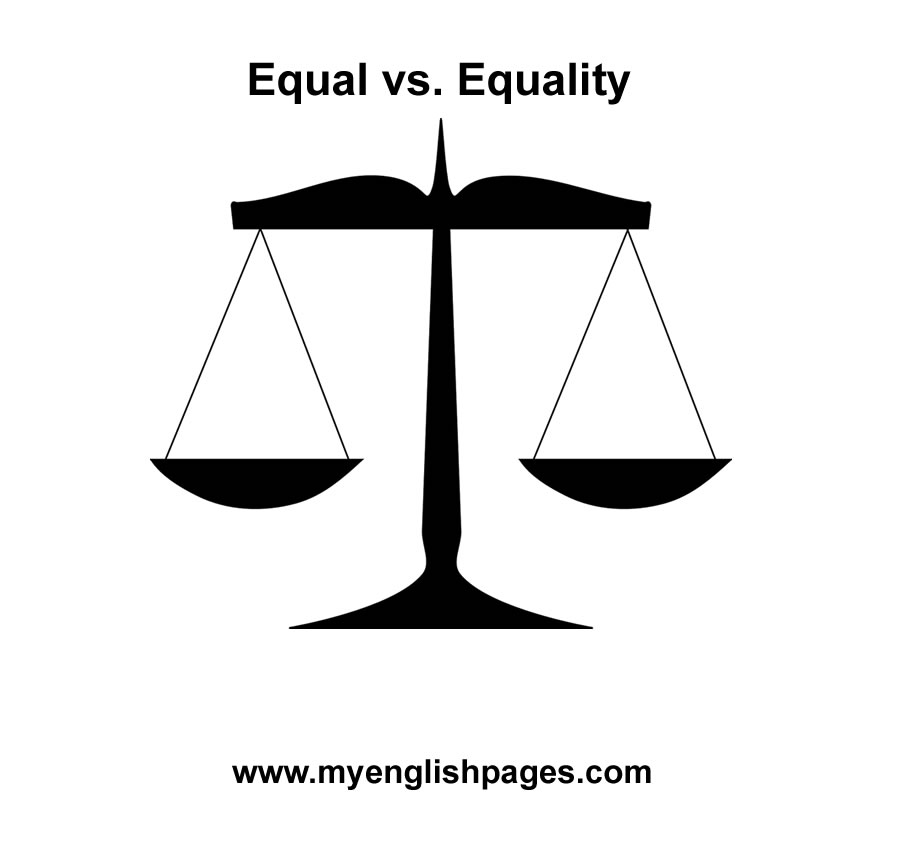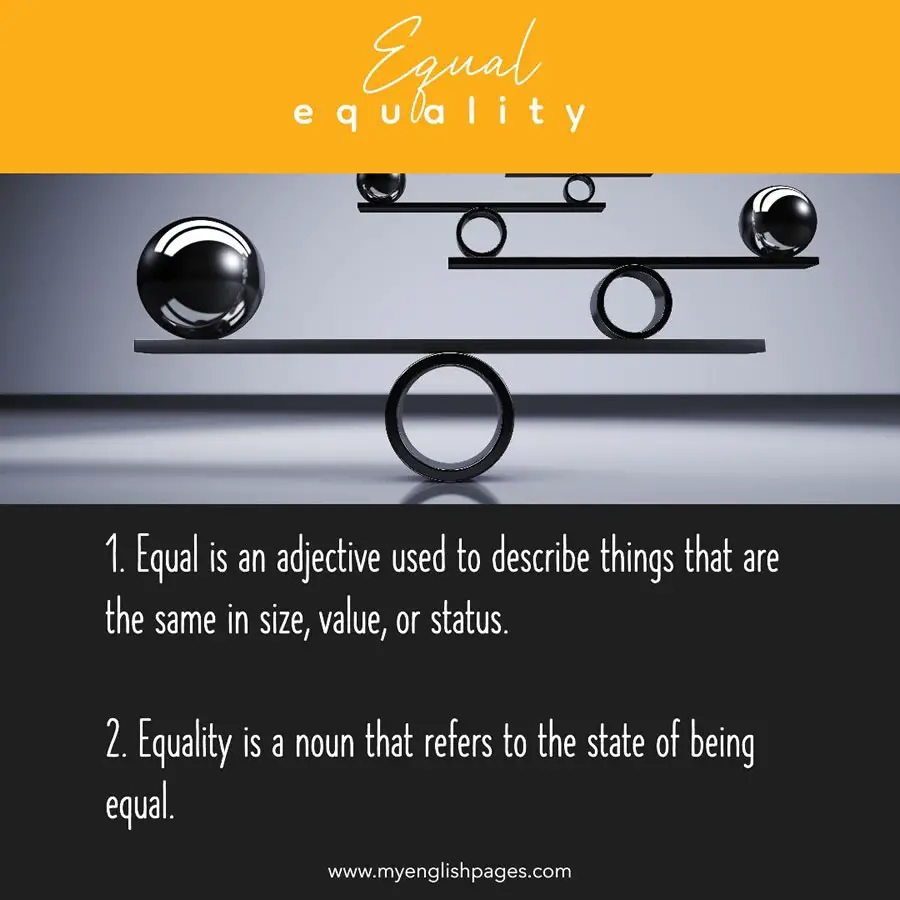Table of Contents
Introduction
When learning English, it’s easy to get confused between words that seem similar, like “equal” and “equality.” Although these words are related, they have distinct meanings and uses. In this article, we’ll explore their differences to help you understand how to use them correctly.
If you are in a hurry, here is a concise explanation:
Equal is an adjective used to describe things that are the same in size, value, or status, while equality is a noun that refers to the state of being equal, especially in terms of rights and fairness. In simple terms, equal compares things directly, and equality refers to the overall concept of fairness and equal treatment.
The Difference Between Equal and Equality

Let’s explore the difference between equal and equality in more detail:
What Does “Equal” Mean?
“Equal“ is an adjective that describes something as being the same in quantity, size, value, or status. It can also be used as a verb, meaning to make something the same or balanced.
Examples:
- Adjective: The two sides of the triangle are equal in length.
- Verb: The results of the experiment equal the predictions made by the scientists.
When “equal” is used as an adjective, it highlights the idea of fairness and sameness between two or more things. If something is “equal,” it means there is no difference in value or amount.
Other uses:
- “Equal” can also describe people or things having the same status, rights, or opportunities.
- Example: All students should be given equal opportunities to succeed.
Synonyms and Antonyms for “Equal”
Synonyms for Equal (adjective):
- Identical
- Uniform
- Equivalent
- Even
- Balanced
- Same
- Comparable
- Level
- Fair
Antonyms for Equal (adjective):
- Unequal
- Different
- Uneven
- Varied
- Imbalanced
- Disproportionate
- Inconsistent
- Unfair
What Does “Equality” Mean?
“Equality” is a noun that refers to the state of being equal, especially in status, rights, and opportunities. It focuses on the concept or condition where people or things have the same value or status.
Examples:
- Many activists fight for equality in education.
- Achieving gender equality remains a challenge in many countries.
“Equality” is often used in discussions about social issues, such as gender, racial, or economic equality. It refers to the broader idea of fairness, justice, and the same rights for all.
Synonyms and Antonyms for “Equality”
Synonyms for Equality (noun):
- Fairness
- Justice
- Impartiality
- Parity
- Equity
- Evenness
- Uniformity
- Balance
- Sameness
Antonyms for Equality (noun):
- Inequality
- Discrimination
- Bias
- Disparity
- Imbalance
- Injustice
- Unfairness
- Partiality
- Favoritism

Key Differences Between “Equal” and “Equality”
- Part of Speech:
- “Equal” is usually an adjective or verb.
- “Equality” is a noun.
- Usage:
- “Equal” is used to describe things that are the same in value, size, or amount.
- “Equality” refers to a state or condition where everything or everyone is treated the same.
- Context:
- You use “equal” when you’re comparing two or more things directly.
- Example: The pay was equal for both employees.
- “Equality” is broader and abstract, often used in discussions about social justice or rights.
- Example: The goal of the law is to promote equality.
- You use “equal” when you’re comparing two or more things directly.
Common Mistakes to Avoid
One common mistake is using “equal” when “equality” is needed and vice versa. Remember:
- If you’re talking about fairness or sameness in a general sense, use equality.
- If you’re comparing two things or describing their sameness, use equal.
Example Sentences for Practice:
- Everyone should have equal access to education. (Adjective)
- The organization fights for equality in the workplace. (Noun)
- Both teams scored an equal number of goals in the match. (Adjective)
- The company aims to create a culture of equality for all employees. (Noun)
Practice Exercise: Equal or Equality
Fill in the blanks with either equal or equality in the sentences below:
- The new policy aims to promote gender __________ in the workplace.
- All the students received __________ marks on their final exam.
- The activists are fighting for __________ in education across the country.
- The number of votes for both candidates was __________, so a tiebreaker was needed.
- The company believes in treating all employees with __________, regardless of their background.
- The two competitors have __________ chances of winning the race.
- Social __________ has been a key issue in political debates for years.
- Everyone should have __________ access to healthcare and education.
- Their abilities are __________, so it’s hard to say who will win.
- The United Nations strives to achieve global __________ in human rights.
Conclusion
Understanding the difference between equal and equality can help you use these words accurately and confidently. While they are closely related, “equal” describes a direct comparison between things or people, and “equality” refers to a general state or condition of fairness. Keep this in mind, and you’ll never confuse them again!
Related Pages


